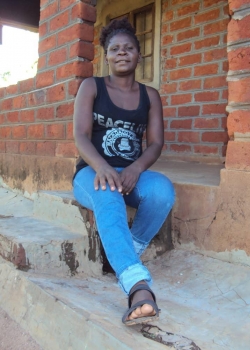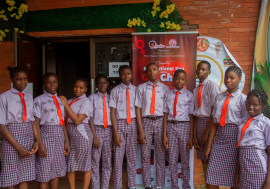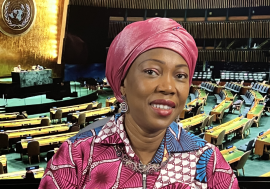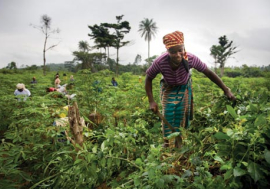
In Lunzu town, about 8 miles outside Blantyre, the commercial capital of Malawi, highways roar with the sound of motorcycle taxis careening between car lanes. Driven mostly by young men in their 20s, the motorcycles bear brand names like Jiangsu, Lifan or Lifo.

It is overwhelmingly a male occupation. Hardly a woman in sight drives a motorcycle.
Yet, a growing number of entrepreneurial women are quietly pooling their money in women’s clubs, eyeing something more lucrative: buying outright the cash-spinning motorcycles and leasing them out to the male drivers.
“The deal is that we pocket 65% of the day´s takings,” says Sarah Showe, one of the women entrepreneurs. The driver takes the rest.
No motorcycle taxi driving for a woman
Women unable to find work driving motorcycle taxis is a reflection of a wider societal challenge related to prejudice and gender-based violence - one in three Malawian women between the ages of 15 and 49 has encountered sexual violence, according to a 2018 study published in the BioMed Central.
“Socially it´s deeply frowned upon here for women to revv up motorcycle taxis, and haggle for passengers in taxi ranks packed with men,” says Ms. Showe, who leases three motorcycles daily to male drivers.
Her friend, Lomu Thomsonu, a teacher, once attempted to defy the norms during her school holidays. It ended badly. “When we tried in 2017, customers would insult female bikers off the highway and male customers would refuse to pay female taxi cyclists at night. So much went wrong,” she said.
Finally, in July 2017, the Lunzu Women’s Motorcycle Fund Club, a group of 40 female entrepreneurs, was formed with a goal of owning the motorcycle taxis and managing them behind the scenes.

“It has since expanded into 10 such clubs of 40 female entrepreneurs each in the wider Blantyre, a city of about 800,000 people,” says Carter Mavhiza, an accountant who helped the women get the bikes at an affordable price.
Women find new income
In Lunzu, a town of 17,000 inhabitants, hundreds of motorcycle taxis ferry everyone and everything, from pregnant women going to hospitals, to bankers going to work, to kindergarten children going to school, or even furniture and cement bags.
“In Lunzu, they are filling a critical gap because we do not have a proper city-bus transit system or digital taxi platforms like Uber,” adds Mr. Mavhiza.
So, whilst women like Ms. Showe and Ms. Thomsonu, are effectively “barred” from driving motorcycle taxis, they take pride in being the motorbike owners. As Ms. Thomsonu reveals: “A road-fit Lifan motorcycle nets about $15 a day. My male driver-cyclist pockets about $6 from the deal. And the young men work from 6am in the morning to 6:30pm in the evening.”
For other female motorcycle owners like Chifundo Magombo, 38, a beans farmer in Blantyre city, exclusion from driving these motorcycle taxis has been a blessing in disguise. The young men operate the motorcycles while Ms. Magombo and other female owners free up their time to do other income-generating jobs that help to increase farming activities or pay for childcare.
For Ms. Thomsonu, the teacher, the new income stream is bolstering her retirement funds. She says: “My $7,000 teacher pension won´t last me even two years. Buying motorcycles now I feel is a smart move.”
Growing community of women owners
Some municipal governments in Malawi have now begun mentoring the women motorcycles owners. For example, the Mchinji District Council in western Malawi arranges mentorships to connect the entrepreneurs and recommends loans of between $250 and $779 to registered women motorcycle clubs.
“We mentor them and write reference letters so they can obtain low-interest loans from private financiers. This is our way of ensuring gender parity in the motorcycle taxi sector. It ensures that women’s household finances are bolstered. Also, women are more reliable in repaying loans,” says Mwaimuna Mwanyali, a councillor in Mchinji.
In some of the cities in Malawi, the emergence of women motorcycle ownership clubs has enabled more women than men to belong to unions.
“The business of women motorcycle owners rather than drivers is growing. In our town we now have 200 women who are unionized. Male operators largely shun unions,” says Stacy Harawa, the President of Mzuzu Motorcycle Union, in Mzuzu the tourist capital of northern Malawi.
For a $10 monthly union fee, women motorcycle owners have insurance from accidents that could wipe out their asset, Ms. Harawa adds. “We are petitioning the taxing collecting Malawi Revenue Authority to reduce license fees for women motorcycle owners provided they are from a registered union.”
It feels super to employ men, concludes Ms. Showe. “I´m able to create employment now. I employ my male nephews as motorcycles drivers. We agree on daily targets. Tables have turned.”























